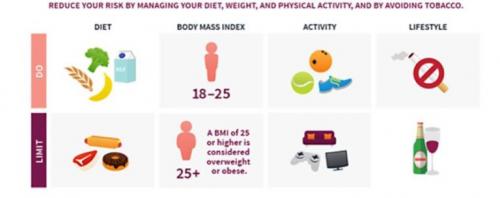Prevent Colorectal Cancer with Timely Screenings
Did you know colorectal cancer is the second leading cause of death in women and 3rd for men? However, when caught in its very early stages, can have up to a 90% 5-year survival rate, according to the American Cancer Society. “This is a largely preventable or curable cancer with early detection and removal of precancerous polyps. Unlike breast, lung or prostate cancer, we can prevent many colon cancers,” said Dr. John Bozdech of Quincy Medical Group.
1 in 20
The likelihood of developing colon cancer in your lifetime.
Unfortunately, many avoid colorectal screenings out of fear or wait until symptoms show. “Fear of what might be found is a common thing I hear, yet a cancer with symptoms is much less likely to be curable, so waiting until you have problems is a bad idea. By detecting and removing polyps, we can prevent most cancers and most of the cancers detected by screening colonoscopy are curable. Needing a colostomy is very rare. Some people worry about pain, but with our current sedation most people have little or no memory of the test. The preparation is much easier than it used to be,” Dr. Bozdech said.
136,000
Number of new cases of colorectal cancer each year in the United States.
How can I reduce my risk for Colon Cancer?
Screenings
The American Cancer Society recently began recommending screening colonoscopies begin at age 45, but insurance may not cover the screening until age 50.
Exercise and Nutrition
Eat a low-fat, high-fiber diet that includes at least five servings of fruits and vegetables each day and make sure to get moving!

What can I expect during a colonoscopy screening?
Your colon needs to be empty prior to the screening, therefore, the day before it’s necessary to stick to a clear, liquid diet, no solid foods. That evening, you will need to drink a liquid “prep” that will help clear out the colon, meaning you’ll want to stay close to the bathroom.
1 in 3
American adults who aren’t screened for colorectal cancer as recommended — almost 23 million total.
The colonoscopy procedure lasts between 30 – 60 minutes. Light sedation will be administered. A colonoscope is inserted into your colon and used to look for abnormal growths or polyps. If something abnormal is found it will either be removed or biopsied. It’s advised to have someone with you to drive you home as you might be groggy from the procedure.
10
Number of years recommended between colonoscopies for average-risk individuals.
Several other options exist, such as virtual colonoscopies or mail-order tests. “Even though they are not as gold standard as colonoscopy, any screening is better than no screening,” said Dr. Harsha of Blessing Physician Services. “Meet with your primary care physician or a specialist to have a discussion about any specific concerns or find out about alternatives for a colonoscopy,” he recommends.
To read further on this, check out our Fall newsletter. And, if you are 45-50 or have a family history of colon cancer, and have not yet had a colonoscopy, make the call. Dr. Harsha Polavarupa sees patients at Culbertson the second and fourth Thursday. To schedule an appointment with Dr. Harsha, call the Registration Department at 217-322-5271.
